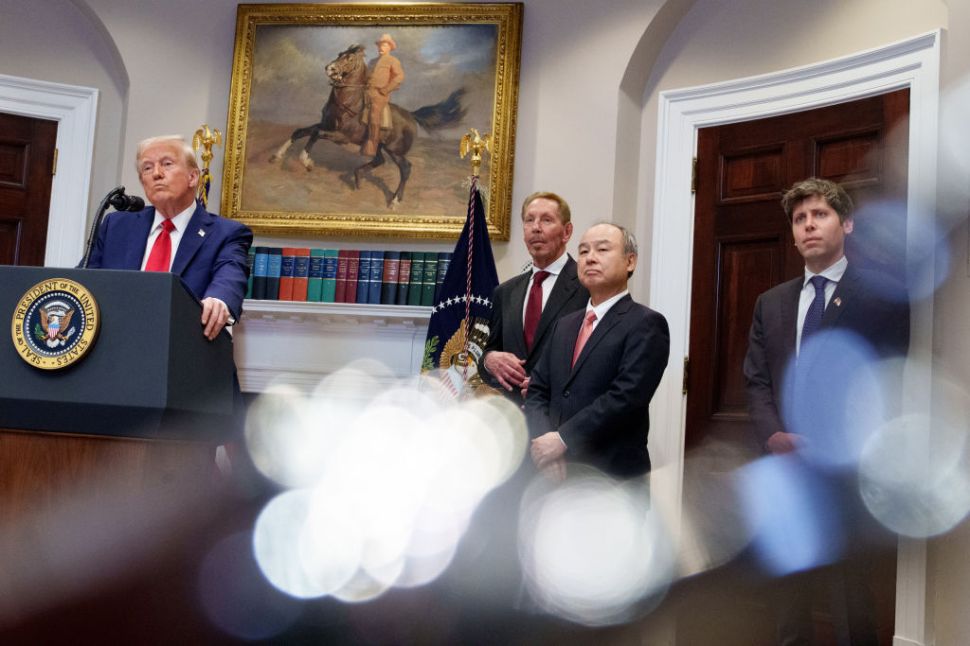On Tuesday (Jan. 21), President Donald Trump announced an A.I. initiative called Stargate. During a press conference at the White House attended by OpenAI CEO Sam Altman, SoftBank CEO Masayoshi Son and Oracle founder Larry Ellison, the returning President told reporters the initiative will invest $500 billion—equivalent to almost 2 percent of the annual U.S. economic output—over the next four years to bolster A.I. infrastructure in the U.S. and help the nation gain an edge over China. Trump estimates the Stargate will create 100,000 jobs.
OpenAI will lead the project alongside Oracle, SoftBank and the UAE government’s tech investment arm, MGX. Other key players in the tech alliance include Nvidia, Microsoft and Arm.
What will Stargate build?
Seemingly a nod to Roland Emmerich’s 1994 sci-fi film “Stargate,” which explores the concept of intergalactic portals—Stargate will develop “physical and virtual infrastructure” to power advanced A.I. systems, according to the President. The project is launching with an immediate $100 billion funding commitment to address critical challenges in A.I. infrastructure, such as the need for cutting-edge data centers across the U.S. and the electricity to power them.
The partnership capitalizes on OpenAI’s established ties with Nvidia, which began in 2016, and a newer collaboration with Oracle, leveraging the company’s expertise in data centers and enterprise analytics. SoftBank’s financial resources further bolster the project, but details remain scarce. Nvidia and Oracle didn’t respond to requests for comment by Observer.
Stargate’s first data center, which will span one million square feet, is already under construction in Abilene, Texas, Ellison said at this week’s press conference, adding that “more will be built” across other U.S. locations.
Does Stargate actually have $500 billion?
Tech leaders not involved in the project are skeptical about its viability, especially given its massive size. Elon Musk, who has been vocal in his criticism of OpenAI, challenged the viability of the project’s funding. “They don’t actually have the money,” Musk wrote on X. “SoftBank has well under $10B secured. I have that on good authority.”
Altman responded to Musk’s doubt by offering to show him the ongoing construction of the data centers. “Want to come visit the first site already under way?,” Altman wrote in a retort on X. “I realize what is great for the country isn’t always what’s optimal for your companies, but in your new role I hope you’ll mostly put America first.”
Musk also questioned Altman’s newfound support for Trump, citing his anti-Trump tweets during the 2016 Presidential election. He shared a screenshots of Altman’s 2021 post where the OpenAI CEO expressed gratitude to LinkedIn co-founder Reid Hoffman for funding legal efforts to preventing Trump’s re-election in 2020. In a post yesterday, Altman said watching the President more carefully recently has really changed my perspective on him. I’m not going to agree with him on everything, but I think he will be incredible for the country in many ways!”
Big tech companies are racing to build their own data centers. Amazon’s AWS recently pledged $11 billion to expand data centers in Georgia; Meta announced a $10 billion A.I. hub in Louisiana; and Musk’s xAI recently built a data center in Memphis.
At the 2025 World Economic Forum in Davos, Switzerland this week, Microsoft (MSFT) CEO Satya Nadella addressed Musk’s remarks on Stargate, reaffirming the company’s $80 billion commitment to expanding A.I. infrastructure globally. “All I know is, I’m good for my $80 billion,” Nadella said. “And all this money is not about hyping A.I., but is about building useful things for the real world!” He commented under Musk’s post on X.
Despite the tensions, experts see the project as a necessary step to secure the U.S.’s leadership in the global A.I. race. “Stargate Project is the foundation we need to power the next generation of A.I. agents,” Claudionor Coelho, chief A.I. officer of the cloud security company Zscaler, told Observer.
Matt Zeiler, founder and CEO of the deep learning and A.I. lifecycle platform Clarifai, said for Stargate to be truly successful, it must make a mark across multiple domains. He pointed to the rapid progress of foundational A.I. models in fields ranging from protein folding to patient communication. “In areas where A.I. architectures like transformers are already proving effective or where data can be easily tokenized, Stargate has the potential to be a game changer,” he told Observer.

